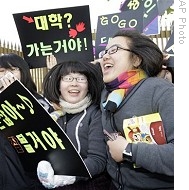voa标准英语2008-South Korean Parents Dissatisfied With Education
时间:2019-01-11 作者:英语课 分类:VOA标准英语2008年(十二月)

South Korean students cheer for their seniors' success in College Scholastic 4 Ability Test in front of exam hall in downtown Seoul, 13 Nov 2008
Most of the Etoos Academy's 150 students spend their days in the library, squeezed into cubicles 5 and surrounded by books. Students like 19-year-old Kim Hong Seop wake up at six and study until midnight. Even though he does not get much sleep, he says studying in this cram school is worth it.
At first it was really difficult here, Kim says, but as time went by he got used to it and the school has really helped him study.
The students at Etoos did not score high enough on the national university entrance exam to enter their top choice for college. So they are studying to re-take the test.
The school's director, Lee Seung Ho, says parents are willing to pay $20,000 to enroll their children in his school.
Lee says students in South Korea have to pass this test to go to university. Getting into a university lifts their social standing 6 and helps them get good jobs.
In South Korea, admission into a prestigious 7 university is not only an accomplishment 8 for students, but also reflects on their families.
Education here is rigorous, particularly in secondary school, where students are expected to be in class or exam schools for more than eight hours a day.
But while students receive a high quantity of education, many critics say the quality is low.
International rankings of higher education compiled by the World Economic Forum 9 put South Korea in 60th place.
Another survey, conducted by Switzerland's International Institute of Management Development, places young South Koreans in the bottom half of its list of university graduates prepared to work in a competitive economy.
Tom Coyner, president of the consulting firm Soft Landing Korea in Seoul, says tests that rely on multiple choice questions, like the university entrance exam, do not encourage students to think critically. He says that is one reason South Korean schools place low on some international rankings.
"There is this need to not waste time looking at other possible answers or issues, but to only focus on consistently choosing the one correct answer on the test and this mentality 10 continues on into the university system," said Coyner.
Conyer says many families see the flaws in the education system and prefer to send their children to school abroad. This also helps them become fluent in English, which is seen as essential for business success.
Tens of thousands of South Korean children are sent overseas to go to secondary school or university, at great cost. In many cases, their mothers go with them, leaving fathers at home working.
But to avoid the struggle of getting visas and to avoid high tuition fees for international students, some parents go to great lengths to get their children foreign passports.
Thirty-one-year-old Jess just returned home to South Korea from the United States territory of Guam, where she gave birth to a baby girl. Being born on Guam automatically means her daughter can have U.S. citizenship 11.
Jess says she and her husband do not want their child to go to school in South Korea.
"We don't like the Korean education system, because it's a lot of study, study, study, study. Children, they don't know what to do, they are like robots. We think the American education system is better than Korea," said Jess.
There are dozens of so-called birth tour agencies that help mothers like Jess travel to the U.S. to have their babies. And since South Koreans no longer need visas to visit the U.S. for up to 90 days, more pregnant Korean women are expected to take this type of trip. Taking this trip now will mean their children do not have to spend years of their lives in cram schools later.
- I should like to enroll all my children in the swimming class.我愿意让我的孩子们都参加游泳班。
- They enroll him as a member of the club.他们吸收他为俱乐部会员。
- There was such a cram in the church.教堂里拥挤得要命。
- The room's full,we can't cram any more people in.屋里满满的,再也挤不进去人了。
- A child's access to schooling varies greatly from area to area.孩子获得学校教育的机会因地区不同而大相径庭。
- Backward children need a special kind of schooling.天赋差的孩子需要特殊的教育。
- There was a careful avoidance of the sensitive topic in the scholastic circles.学术界小心地避开那个敏感的话题。
- This would do harm to students' scholastic performance in the long run.这将对学生未来的学习成绩有害。
- Security guards, operating inside bullet-proof glass cubicles, and speaking through microphones, scrutinized every arrival and departure. 警卫们在装有防弹玻璃的小室里值勤,通过麦克风细致盘问每一个进出的人。 来自辞典例句
- I guess they thought me content to stay in cubicles. 我猜他们认为我愿意呆在小房间里。 来自互联网
- After the earthquake only a few houses were left standing.地震过后只有几幢房屋还立着。
- They're standing out against any change in the law.他们坚决反对对法律做任何修改。
- The young man graduated from a prestigious university.这个年轻人毕业于一所名牌大学。
- You may even join a prestigious magazine as a contributing editor.甚至可能会加入一个知名杂志做编辑。
- The series of paintings is quite an accomplishment.这一系列的绘画真是了不起的成就。
- Money will be crucial to the accomplishment of our objectives.要实现我们的目标,钱是至关重要的。
- They're holding a forum on new ways of teaching history.他们正在举行历史教学讨论会。
- The organisation would provide a forum where problems could be discussed.这个组织将提供一个可以讨论问题的平台。
- He has many years'experience of the criminal mentality.他研究犯罪心理有多年经验。
- Running a business requires a very different mentality from being a salaried employee.经营企业所要求具备的心态和上班族的心态截然不同。
- He was born in Sweden,but he doesn't have Swedish citizenship.他在瑞典出生,但没有瑞典公民身分。
- Ten years later,she chose to take Australian citizenship.十年后,她选择了澳大利亚国籍。